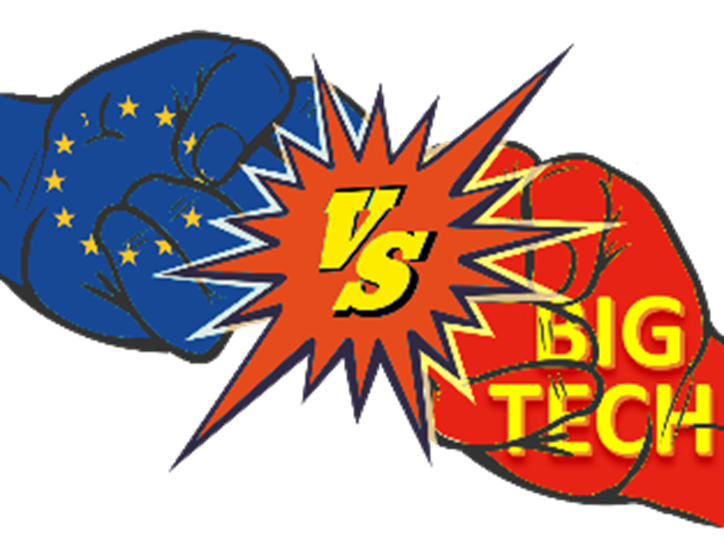Earlier this week, the European Parliament “voted its stamp of approval for the two laws — one focused on anticompetitive behavior, the other on content deemed illegal in Europe.”[1] The first law, called the Digital Markets Act (DMA), will ban “certain practices used by large platforms acting as ‘gatekeepers’ and enable the Commission to carry out market investigations and sanction non-compliant behavior.”[2] Benjamin Mueller (@Ben_CDI), a senior policy analyst at the Center for Data Innovation, calls it, “The EU’s biggest change to antitrust law in decades.”[3] The second law, called the Digital Services Act (DSA), “sets out an unprecedented new standard for the accountability of online platforms regarding illegal and harmful content.”[4] Tech writers Sam Schechner (@samschech) and Kim Mackrael (@kimmackrael) insist that the new E.U. regulations are “paving the way for clashes between regulators and some of the world’s biggest tech companies over how the rules should be applied.”[5] It’s fair to say, the world is watching — including U.S. policymakers.
What the new regulations involve
As Schechner and Mackrael note, the DMA is targeting big tech companies. A European Parliament press release makes this abundantly clear. It states, “The text provisionally agreed by Parliament and Council negotiators targets large companies providing so-called ‘core platform services’ most prone to unfair business practices, such as social networks or search engines, with a market capitalization of at least 75 billion euro or an annual turnover of 7.5 billion. To be designated as ‘gatekeepers’, these companies must also provide certain services such as browsers, messengers or social media, which have at least 45 million monthly end users in the EU and 10 000 annual business users.”[6] The DSA is also aimed primarily at big tech companies. A European Commission press release states, “The new framework under the DSA is founded on European values, including the respect of human rights, freedom, democracy, equality and the rule of law. It will rebalance the rights and responsibilities of users, online intermediaries, including online platforms as well as very large online platforms, and public authorities.”[7]
The European Commission insists, “Together [the DMA and DSA] form a single set of new rules that will be applicable across the whole EU to create a safer and more open digital space. The DSA and DMA have two main goals: 1) to create a safer digital space in which the fundamental rights of all users of digital services are protected; and 2) to establish a level playing field to foster innovation, growth, and competitiveness, both in the European Single Market and globally.”[8] The legislation addresses three main areas: online platforms; online user safety; and online content. A European Parliament press release explains what each area involves.[9]
More responsible online platforms
“Under the new rules, intermediary services, namely online platforms – such as social media and marketplaces – will have to take measures to protect their users from illegal content, goods and services.”
• Algorithmic accountability: The European Commission as well as the member states will have access to the algorithms of very large online platforms;
• Swift removal of illegal content online, including products, services: A clearer “notice and action” procedure where users will be empowered to report illegal content online and online platforms will have to act quickly;
• Fundamental rights to be protected also online: Stronger safeguards to ensure notices are processed in a non-arbitrary and non-discriminatory manner and with respect for fundamental rights, including the freedom of expression and data protection;
• More responsible online marketplaces: They have to ensure that consumers can purchase safe products or services online, by strengthening checks to prove that the information provided by traders is reliable (“Know Your Business Customer” principle) and make efforts to prevent illegal content appearing on their platforms, including through random checks;
• Victims of cyber violence will be better protected especially against non-consensual sharing of illegal content (revenge porn) with immediate takedowns;
• Fewer burdens and more time to adapt for SMEs: Longer period to apply the new rules will support innovation in the digital economy. The Commission will follow closely the potential economic effects of the new obligations on small businesses.
Safer online space for users
• New transparency obligationsfor platforms will allow users to be better informed about how content is recommended to them (recommender systems) and to choose at least one option not based on profiling;
• Online advertising: Users will have better control over how their personal data are used. Targeted advertising is banned when it comes to sensitive data (e.g., based on sexual orientation, religion, ethnicity);
• Protection of minors: Platforms accessible to minors will have to take specific measures to protect them, including by fully banning targeted advertising;
• Manipulating users’ choices through ‘dark patterns’ will be prohibited: Online platforms and marketplaces should not nudge people into using their services, for example by giving more prominence to a particular choice or urging the recipient to change their choice via interfering pop-ups. Moreover, cancelling a subscription for a service should become as easy as subscribing to it;
• Compensation: Recipients of digital services will have a right to seek redress for any damages or loss suffered due to infringements by platforms.
Harmful content and disinformation
“Very large online platforms will have to comply with stricter obligations under the DSA, proportionate to the significant societal risks they pose when disseminating illegal and harmful content, including disinformation.”
• Very large online platforms will have to assess and mitigate systemic risksand be subject to independent audits each year. In addition, those large platforms that use so-called “recommender systems” (algorithms that determine what users see) must provide at least one option that is not based on profiling;
• Special measures in times of crisis: when a crisis occurs, such as a public security or health threat, the Commission may require very large platforms to limit any urgent threats on its platforms. These specific actions are limited to three months.
Concluding Thoughts
The E.U. fully expects their legislation to set the bar for global standards. And penalties for failure to follow the regulations are severe. Schechner and Mackrael report, “The laws, which are backed by the threat of noncompliance fines in some extreme cases of as much as 20% of a company’s annual world-wide revenue, are the most far-reaching Western efforts to rein in technology companies in at least a generation.” In the coming months, you can expect large tech companies to push back against the regulations. Mueller believes the laws are simply an attempt to punish “companies that are too big or too American.” He adds, “Those actively cheerleading the EU’s anti-growth tech policy agenda ignore the DMA’s many flaws. … The DMA is a sad indictment of how the EU fails to deliver the fruits of the digital revolution to its citizens. The act is vague and at times contradictory, suggesting that it was spurred into being primarily by an urge to act rather than a clear understanding of what policies would actually increase public welfare.” Nevertheless, the lines are drawn. Let the battles begin.
Footnotes
[1] Sam Schechner and Kim Mackrael, “EU Lawmakers Approve Sweeping Digital Regulations,” The Wall Street Journal, 5 July 2022.
[2] European Parliament, “Deal on Digital Markets Act: EU rules to ensure fair competition and more choice for users,” Press Release, 24 March 2022.
[3] Benjamin Mueller, “Misconceptions About Digital Competition Are Damaging the EU’s Technology Ambitions,” Center for Data Innovation, 28 June 2022.
[4] European Commission, “Digital Services Act: Commission welcomes political agreement on rules ensuring a safe and accountable online environment,” Press Release, 23 April 2022.
[5] Schechner and Mackrael, op. cit.
[6] European Parliament, op. cit.
[7] European Commission, op. cit.
[8] European Commission, “The Digital Services Act package,” Press Release, 2022.
[9] European Parliament, “Digital Services Act: agreement for a transparent and safe online environment,” Press Release, 23 April 2022.





